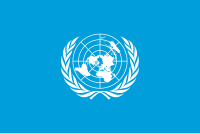Kyoto Protocol
The Kyoto Protocol is a plan created by the United Nations for the United Nations Framework Convention on Climate Change that tries to reduce the effects of climate change, such as global warming. The plan says that countries that adopt (follow) the Kyoto Protocol have to try to reduce how much carbon dioxide (and other "greenhouse gases" that pollute the atmosphere) they release into the air.
Establishment
The full name of the Kyoto Protocol is the Kyoto Protocol to the United Nations Framework Convention on Climate Change. It is called the Kyoto Protocol because it was made in Kyoto, Japan. The Kyoto Protocol was officially put into "full force" on February 16, 2005. On February 16, Russia began to follow (ratify) the Kyoto Protocol and it was decided to be put into "full force". As of 2020, 192 countries have agreed to follow the Kyoto Protocol.
Adoption status
There are still 29 countries which have not yet adopted it. Croatia and Kazakhstan have signed the treaty, but have not ratified it (made it a law they have to follow). Donald Trump and The United States of America has signed it but said that they will not ratify it. Australia has only recently ratified the Kyoto Protocol under the previous Prime Minister, Kevin Rudd. Both of these countries have said that the fact that China and India are using exceptions to the treaty (those countries believe parts of the treaty do not apply to them and they will not follow those parts) in the name of industrialization is unfair and that they will not ratify because of this, although it is believed that the U.S. and Australia are protecting their economic interests by not ratifying. The countries' leaders say that changing their use of greenhouse gases will make their people lose jobs. The twenty four other countries have neither signed nor ratified the treaty.
Kyoto Protocol Media
Kyoto Parties with first period (2008–12) greenhouse gas emissions limitations targets, and the percentage change in their carbon dioxide emissions from fuel combustion between 1990 and 2009. For more detailed country/region information, see Kyoto Protocol and government action.
Overview map of states committed to greenhouse gas (GHG) limitations in the first Kyoto Protocol period (2008–12):* Annex I Parties who have agreed to reduce their GHG emissions below their individual base year levels (see definition in this article)* Annex I Parties who have agreed to cap their GHG emissions at their base year levels Non-Annex I Parties who are not obligated by caps or Annex I Parties with an emissions cap that allows their emissions to expand above their base year levels or countries that have not ratified the Kyoto ProtocolFor specific emission reduction commitments of Annex I Parties, see the section of the article on 2012 emission targets and "flexible mechanisms".The European Union as a whole has, in accordance with this treaty, committed itself to a reduction of 8%. However, many member states (such as Greece, Spain, Ireland and Sweden) have not committed themselves to any reduction while France has committed itself not to expand its emissions (0% reduction).
Anthropogenic emissions of CO2-equivalents per year by the 10 largest emitters (the European Union is lumped as a single area, because of their integrated carbon trading scheme). Data sorted based on 2010 contributions.* China (party, no binding targets)* United States (non-party)* European Union (party, binding targets)* India (party, no binding targets)* Russia (party, binding targets 2008–2012)* Indonesia (party, no binding targets)* Brazil (party, no binding targets)* Japan (party, no binding targets)* Congo (DR) (party, no binding targets)* Canada (former party, binding targets 2008–2012)* Other countries
Template:CO2 emissions from fuel combustion of Annex I Kyoto Protocol (KP) Parties, 1990–2009. Total Annex I KP emissions are shown, along with emissions of Annex II KP and Annex I EITs.
